MU agronomist gives post-drought pasture renovation tips
Learn effective strategies for renovating drought-affected pastures, including no-till drilling, emergency forage options, and long-term forage solutions.
Proper hay storage, feeding methods reduce waste
CLEVER, Mo. –Due to poor storage and feeding methods, only about half of Missouri hay reaches the cow’s mouth, says University of Missouri Extension livestock specialist Andy McCorkill. This leads to waste and reduced profits, especially as producers reset their herds post-drought. “Make sure your high-value hay gets in the mouth of an animal,” says McCorkill.
'Sacrifice pastures' spare best cattle grazing pastures
STOCKTON, Mo. – So-called “sacrifice pastures” might be needed to help promote forage production the rest of this cattle grazing season, according to Patrick Davis, a University of Missouri Extension livestock specialist based in Stockton. “Cattle producers welcome the rain, but it leads to muddy pastures, and with limited forage resources following the drought, proper management is needed for optimum grazing the rest of the year,”…
Avoid applying nitrogen to tall fescue pastures in spring
Reduce livestock loss and toxin risk by avoiding nitrogen fertilization on tall fescue pastures in spring; reserve fertilizing for fall.
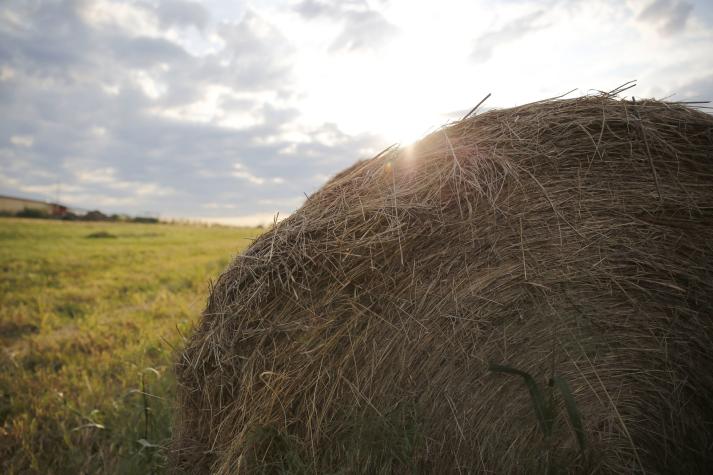
Cheap hay isn't cheap
Cheap hay can cost more in the long run due to poor quality, storage, and feeding practices.
Be ready to manage spring flush
COLUMBIA, Mo. – Get a head start on pastures for the year with good management of spring flush, says University of Missouri Extension state forage specialist Harley Naumann.Early decisions determine pasture health for the rest of the season, Naumann says.
Registration open for fescue workshop
Register for a March workshop on renovating toxic tall fescue pastures and integrating improved varieties into grazing systems.
Workshop tells how and why to renovate tall fescue pastures
COLUMBIA, Mo. – Forage and beef producers can learn from world-renowned forage experts the how and why of renovating toxic tall fescue pastures at a March 23 workshop in Mount Vernon, Missouri.
Forage expert gives 4 top reasons to frost seed legumes
Frost seeding legumes boosts pasture yield, cattle health, and reduces fertilizer costs in Missouri fields.
Boost profits by frost seeding legumes now
Frost seed legumes in cool-season pastures to boost cattle weight and profits while improving pasture health.
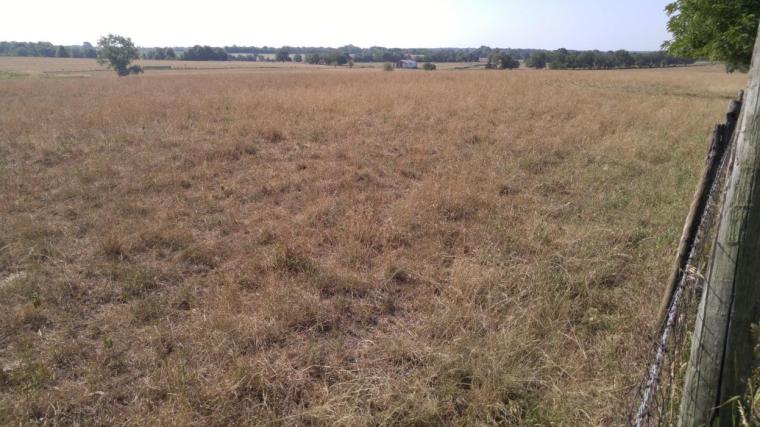
Winter is time to plan to beat the Summer Slump
KIRKSVILLE, Mo. – Winter is the time for livestock producers to prepare pastures for drought, says University of Missouri Extension state forage specialist Harley Naumann. Drought is now the rule rather than the exception in Missouri, Naumann says. According to the U.S. Drought Monitor, somewhere in the state experienced drought every year but one since 2000.
Reduce losses, costs when feeding hay
Learn strategies to reduce hay waste and feeding costs while improving livestock access and performance.
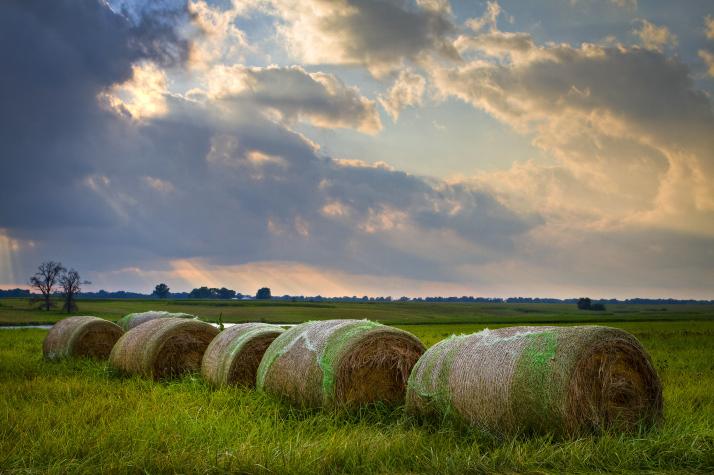
MU Extension offers tips to reduce hay loss
Implementing proper hay storage and feeding practices can reduce waste and preserve quality.
Getting livestock through the winter
SEDALIA, Mo. – Pasture and hay supplies are short in many areas of central and southern Missouri. University of Missouri Extension livestock specialist Gene Schmitz has a number of options for livestock producers to consider for feeding their livestock this winter.Test hay
How you feed hay this winter is more important than ever
GALENA, Mo. – With a shortage of standing forage for cattle and the low availability of hay, it is more important than ever this winter to reduce waste when feeding hay.Hay waste is normal, but it can be controlled and minimized, said University of Missouri Extension agronomy specialist Tim Schnakenberg.
MU videos share cattle management practices in drought
COLUMBIA, Mo. – Drought continues to plague growers and livestock producers in parts of Missouri, especially in the southwest corner of the state, raising concerns about feed availability.“It’s a perfect storm of high fertilizer prices, reduced fertilization of pastures lending to lower hay yields and drought in the southern half of Missouri,” said Eric Bailey, University of Missouri Extension state beef specialist. “Folks are eating…
Regional drought calls for winter feed strategies
MOUNT VERNON, Mo. – Drought in southwestern Missouri calls for long- and short-term feed plans for beef and dairy herds. University of Missouri Extension state dairy specialist Stacey Hamilton urges producers not to panic as local feed supplies dwindle. There are options to carry herds through winter until spring pastures green.
Drought recovery forage options
GALENA, Mo. – “If there was ever a year to focus on stockpiled tall fescue, this is it,” says Tim Schnakenberg, University of Missouri Extension agronomy specialist in Galena.
Apply fall nitrogen now to boost forage stockpiles
COLUMBIA, Mo. – University of Missouri Extension nutrient management specialist John Lory recommends applying fall nitrogen in mid-August to cool-season pastures. Despite drought conditions in much of the state, Lory says, “we need to get nitrogen applied now so we can take full advantage of the rains when they do arrive.”
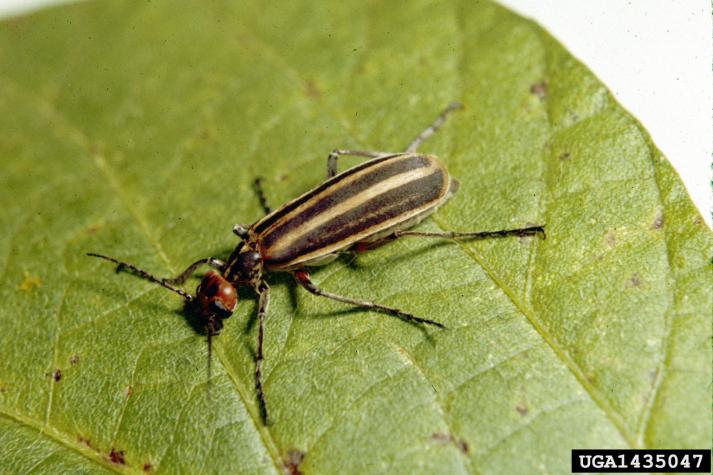
Blister beetles reported in high numbers
Blister beetles are appearing in large numbers, posing risks to horses and livestock due to their toxic cantharidin.
Drought requires feed efficiency in cattle
Drought strains hay supplies; cattle producers can improve efficiency with feed testing, supplements, and careful ration planning.
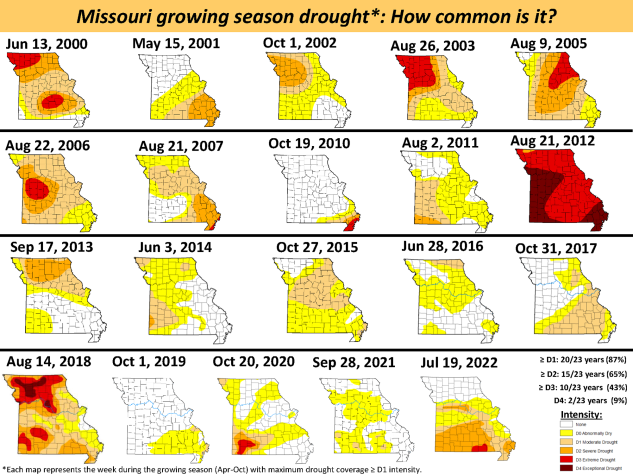
SW Missouri no stranger to drought in forages
Recurring drought in southwest Missouri strains pastures and forage growth; strategies for resilience and recovery.
Short forage supplies require producers to make tough decisions
COLUMBIA, Mo. – Dry weather and short pastures have reduced forage supplies, prompting livestock producers to ponder “could have, would have, should have” scenarios, says University of Missouri Extension livestock specialist Eric Meusch.Producers should try to match their herd needs to anticipated forage supplies, Meusch says. This requires planning before a drought. Many factors will be out of your control if you wait until drought…
Nitrate, prussic acid poisoning follow drought
COLUMBIA, Mo. – Nitrates and prussic acid build up in forages to levels dangerous to livestock during drought.Livestock face severe illness and even death after eating affected forages, says University of Missouri Extension agronomist Jamie Gundel.Nitrates tend to concentrate in the bottom third of the plant. It shows in the plant’s stem and stalks more than leaves, Gundel says.
Tough culling decisions come with drought, forage shortages
COLUMBIA, Mo. – With dry weather and short pastures, Missouri cow-herd owners face tough culling decisions. One way to match cows’ needs to available grass is to sell cows.Give careful thought to which grass eaters go first, says Eric Bailey, University of Missouri Extension beef nutritionist. Under drought stress, identifying those cows becomes urgent.
